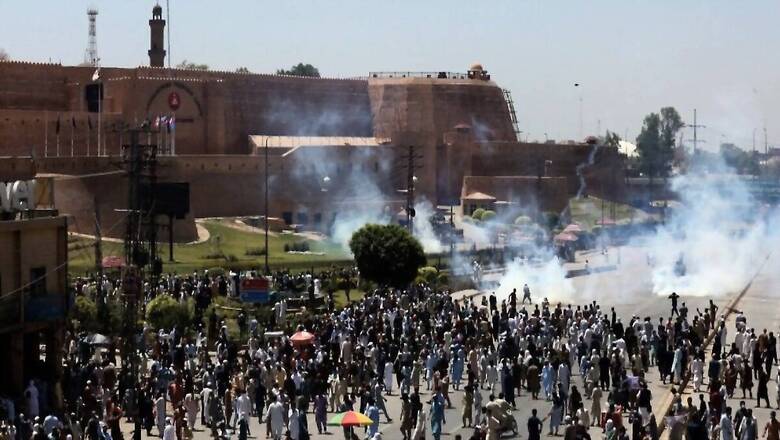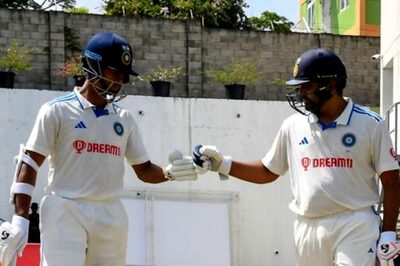
views
Crowds attacking the General Headquarters was bad enough, but the situation turned worse when the supporters of Pakistan’s former prime minister Imran Khan ransacked the Lahore Corps Commanders’ house and reportedly burned the private residence of a senior army official, whom Imran Khan accused of trying to kill him. These are scenes of unbelievable chaos, even for Pakistan. In less than 24 hours, the protests spread across 18 cities, and even outside, to Washington and London. If nothing else, this is evidence of not just meticulous planning by the Pakistan Tehreek-e-Insaf (PTI), but also yet another indicator of the power of social media. This is dangerous and could get worse. What lies ahead is a difficult question, but it could be any of the following.
Spoiler alert. None of them are good.
Scenario 1 – Imran Khan becomes history
The Al-Qadir Trust case which alleges misappropriation of Rs 50 billion is only one case. Khan has now been indicted in the Toshakhana reference which alleges that as prime minister, he ‘purchased’ Toshakhana gifts on payment of Rs 21,564,600 whereas the total value of the gift items was Rs 107,943,000. That crime seems like a pittance when compared to the billions that the Sharifs were alleged to have plundered. The irony? It was Imran Khan through his ISI chief Gen Faiz Hameed, who produced at least 10 volumes of highly publicised ‘proof’ by the Joint Investigation Team on the perfidy of Sharif and his family. In the end, his National Accountability Bureau could only get a ‘technicality’ to send Sharif packing – that as Chairman of a Dubai-based company. He did not declare a salary of 10,000 dirhams till nearly a year after assuming office. That was again small change. Karma comes right back, and Khan could get disqualified – at the very least – on such minor issues. That means he stays put in prison for the foreseeable future. Crowds will not be around forever, and in one year the ex-PM could be history, with ‘leaks’ arranged all the while, to provide juicy details of his corruption in a rehash of exactly what he did to Nawaz Sharif. Meanwhile, the present government completes its full term with the usual bumbling. Overall possible, but not likely, because Imran would have taken this possibility into account.
Scenario 2 – The army within the army
So far, the PTI’s every move has shown shrewd calculation, with Khan literally begging to be arrested with his statements getting more outrageous by the day. As a natural street fighter, he knows that crowds can’t be kept up forever. The arrest will serve his purpose – which is to have a landslide victory in elections – only if he is allowed to go free, even on conditional bail. Such an outcome assumes support from not just within the army but the wider establishment which Raza Rumi describes as including serving and retired army officers, civilian and military intelligence operatives, media persons nurtured by the state gone ‘rogue’, and the information psy-ops infrastructure laid out by the establishment which has assumed a life of its own. Apparent now are rumours of Chairman Joint Chiefs of Staff Shamshad Mirza taking over Asim Munir’s job, while experts talk of families of army officers within the mob. Powerful Veterans groups have weighed in on Imran Khan as a ‘true leader’. There were random acts, such as the arbitrary midnight arrest of the Punjab PTI chief Ch. Pervez Elahi, at a time when the two opposing political heads were sitting down to bury the hatchet. There is trouble within. Gen Munir’s swift deployment of army troops in all major provinces may just work. But reliable sources talk of shelling on the streets of Lahore and heavy use of tear gas in Islamabad. The army is firing on protestors and at least 47 have been killed. This is an emergency right now. If this goes on, then a quiet coup is possible with the new leadership working to reverse the situation entirely. Overall, likely, with a strong dose of rain and thunder.
The martial law element
Since these stirring events took place, the whispers have been of a possible martial law, with clips of General Zia declaring martial law being reprised. But there are strong reasons for this not taking place. A coup would close all doors to the International Monetary Fund (IMF) doling out desperately needed funds. Its charter doesn’t allow assistance to non-democratic forces. Second, in earlier days when the army stepped in – as General Musharraf did – they were greeted as ‘saviours’ of the people. Today, they are seen as the enemy. And that is not limited to just PTI workers. Severe economic pain and hardship have certainly contributed to the crowds spilling on the streets. And the army is seen – quite justifiably so – as the architect of a system that has let the country down. Martial law would be challenged at all levels, besides bringing international opprobrium to the country, at a time when it needs support the most.
Worst case – Khan takes a toss
The fact that someone tried to kill Khan is a reality. This could happen again when he comes out of prison for a hearing. This is a traditional Pakistani way of getting rid of unruly elements, and Khan is a nuisance within or outside prison walls. A martyred Khan means a certainty of a massive win in elections, which means Shah Mehmood Qureshi (finally) gets to be Prime Minister. The army would have a malleable man at the top, which pretty much defines Qureshi who is more wind vane than anything else. In all fairness, there are also vested interests who want a particular party in power. The key here is timing. Too soon, and it could lead to unmanageable riots and renewed attacks on the army, with crowds baying for the blood of Lt Gen Faisal Naseer of the ISI and others Khan has accused of conniving at his murder. Overall then, it is much too big a risk to take and may carry the present leadership into history together with Khan.
Most likely case
The whole mess has come as a severe shock to most Pakistanis even as PTI leaders are being detained one after another with reports of reliable proof of their collusion in creating the chaos, particularly of burning houses of the army. Meanwhile, the DG-ISPR’s emotive appeal where he warned that this group wearing a political cloak “has done what enemies could not do in 75 years”, all in the lust for power. A larger percentage of Pakistanis are likely to agree that things have gone beyond control. True, the lacklustre address by Prime Minister Sharif notwithstanding, the possibility is that the present system will continue its shaky path. But as experts observe, the ‘hybrid system’ where the army holds the reins behind the politicians, has come apart with each part of the system at war with the other, and the judiciary threatening to become irrelevant. Plus the hybrid system worked because all actors acknowledged the inherent power of the army in all things. That image now lies tattered and the army has to work hard – and unitedly – to regain its ‘saviour’ image.
The future is bleak, but Pakistan is not so fragile that it will break – yet. Much depends on social unrest being fuelled further by economic pain, particularly in restive provinces like Khyber Pakhtunkhwa where the PTI has a strong reputation. Meanwhile, it is said that every disaster can be an opportunity. The present turmoil should ideally lead to the army being pushed, and probably preferring to lick its wounds with a back seat amid the chaos. That means bringing the army under a mildly reasonable degree of civilian control. The trouble is that this needs a strong and trusted leader at the helm with an overwhelming majority in Parliament. The only one capable of getting that is Imran Khan himself. That’s irony upon irony. But watch out. It may just happen.
The author is a Distinguished Fellow at the Institute of Peace and Conflict Studies, New Delhi. She tweets @kartha_tara. The views expressed in this article are those of the author and do not represent the stand of this publication.




















Comments
0 comment